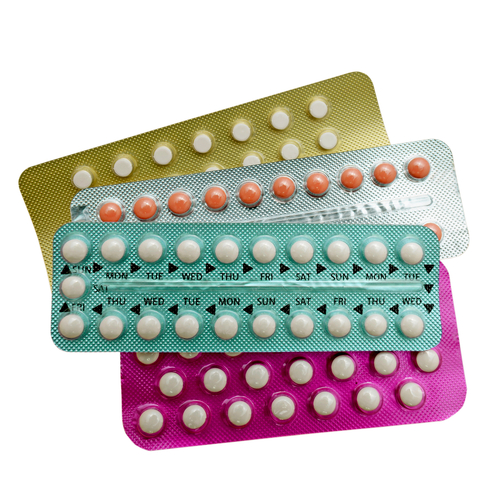Unplanned pregnancy has never been enough of a concern of mine to warrant any use of hormonal contraceptives. I’ve always relied on the effectiveness of condoms when it comes to that issue, and, thankfully, they’ve yet to fail me. Severe PMS and increased menstrual bleeding, however, did start to open my mind to the possibility of using birth control. So when I told my gynecologist about the menstrual symptoms I’d been experiencing during the last couple of years and she asked, “Do you want to try birth control?” I finally answered yes with hopeful reluctance.
We’d had the same exchange during my well woman exam in 2015 but last year my answer was no. I’d heard enough negative stories about the potential side effects of birth control and, frankly, although my periods had become increasingly harder to bear, I wasn’t sure altering my hormonal balance 24/7 for relief for a few days each month was worth it. At the time, my gyno suggested Naproxen Sodium instead, a nonsteroidal anti-inflammatory drug (NSAID) that reduces pain and swelling caused by a number of conditions, including menstrual cramps, by blocking your body’s production of natural substances that cause inflammation. After a couple of doses I decided Ibuprofen was more effective. But while I could use Motrin to ease cramps and headaches, the NSAID could do nothing for the increasingly heavy flow that’d put me in embarrassing situations far too many times in recent months or alleviate the acne and extreme mood swings that’d now become a part of my monthly gift for the first time in my life. And so, tired of the literal mess my periods had become, this year when my doctor asked if I wanted birth control I replied yes.
Though I was still hesitant, I was comforted by the words of my gyno as she told me I didn’t need to feel ashamed of making a lifestyle choice that I felt was best for me. “You’re a professional woman and you’re too far along in your career; you don’t need to put up with bleeding through your clothes and things like that when you don’t have to.” I agreed, and so I picked up my prescription for Microgestin fe 1.5/30, eager to put my PMS struggles behind me. Unfortunately, I picked up a whole new set of problems.
I began taking the pills, which contain a progestin and an estrogen, on a Tuesday morning at 9 am and felt fine throughout the day, the next day I felt pretty regular as well, although I remember feeling that I was surprisingly tired for a work from home day. Thursday morning I began to notice changes in my balance, feeling as though I might faint at any given moment, and mild headaches which continued throughout the weekend. I was also extremely fatigued. Although I wanted to exercise, I found myself too tired to even go for a walk in my neighborhood park, napping for three hours at a time on Saturday and Sunday and not even finding energy to do laundry or cook. When I repeated that same pattern on my day off Monday I began to get concerned, and also connect the dots that perhaps the pills were the cause for the head irritation and fatigue. I came across several stories of women who experienced the same side effects — some were able to wait out the 2-3 month adjustment period for their bodies to get used to the hormonal changes, others decided they had enough. I found myself in the latter category when I woke up from another long nap Monday evening with an overwhelming, almost suicidal sense of doom. (Depression and mood swings are common side effects of birth control pills.) I decided I couldn’t take another day of living like that, and after seven days of being on the pill I stopped completely.
Within two days I started to feel like my pre-birth control self again. My balance issues mostly subsided, I had more energy, and my headaches were starting to decrease in frequency. Day by day, I regained a greater sense of normalcy, finally feeling like my true self again six days after I stopped taking the pills. Unfortunately, that included severe cramps and bleeding when my period came as expected this month, and what hasn’t completely subsided yet are daily headaches. Though they’re mild in severity, throughout the day I continue to feel twinges of pain in my forehead region or an overall pressure on my skull. I emailed my doctor telling her about my decision to stop taking the pills, explaining I was scared to try anything else because of what a negative experience I had with this first birth control attempt. Instead, I’d asked her if taking magnesium supplements might be a better option, as I’d done some research and found the mineral “can decrease the symptoms of premenstrual syndrome, such as mood swings, irritability, depression, anxiety, bloating, fluid retention, breast tenderness, sugar cravings, headaches and poor sleep.” She didn’t object and so I figured it’s worth a shot, especially since Magnesium has proven effective in preventing migraine headaches as well. And since my doctor didn’t try to sell me on another form of birth control, I’m going to take that as a sign hormonal contraception isn’t something I need to experiment with again, at least not right now. I’d rather look into more natural remedies for easing pain and bleeding during what now feels like a relatively small part of the month, rather than suffering every single day.
Have you dealt with adverse side effects from the pill? Did they subside once your body got used to the hormonal changes or did you give up and try a new form of birth control?










